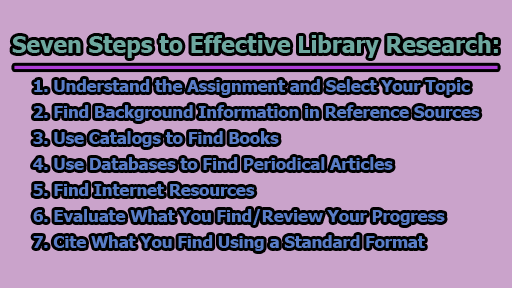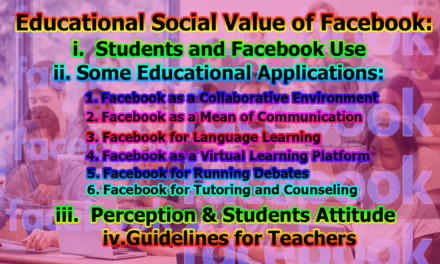Seven Steps to Effective Library Research:
Embarking on a research endeavor demands a disciplined and strategic approach to navigate the vast landscape of available information. Whether one is a seasoned researcher or a novice delving into scholarly exploration, a systematic process is paramount for the success of any academic inquiry. In this context, we will explore the following seven steps to effective library research.
1. Understand the Assignment and Select Your Topic: The initial step in any research endeavor is a comprehensive understanding of the assignment. Break down the prompts into key components and identify the underlying concepts. Pay attention to any specific requirements or constraints outlined in the assignment instructions. Once the parameters are clear, choose a research topic that not only aligns with the assignment’s objectives but also resonates with your personal interests. If the assignment allows flexibility, consider narrowing down your focus to a specific aspect or angle, making your research more targeted and manageable.
2. Find Background Information in Reference Sources: Building a strong foundational knowledge base is essential before delving deeper into specific sources. Reference materials, such as encyclopedias, dictionaries, and handbooks, provide a wealth of background information. Dive into these sources to gain a broader perspective on your chosen topic. Explore not only the main ideas but also the historical context, key terms, and major themes associated with your research. As you absorb this foundational knowledge, take note of bibliographies within these reference sources, as they can guide you to additional reputable materials.
3. Use Catalogs to Find Books: Once you have a solid understanding of your topic, it’s time to explore in-depth resources. Library catalogs, both physical and online, are treasure troves of scholarly works. Begin by formulating targeted searches using relevant keywords, titles, or author names. Pay attention to the different editions, formats, and availability of books. When assessing a potential source, delve into the table of contents and index to evaluate its relevance to your research. Consider the publication date and the author’s credentials to ensure the source’s currency and reliability. This step lays the groundwork for a comprehensive exploration of your research area through the lens of authoritative books.
4. Use Databases to Find Periodical Articles: With a solid foundation from reference sources and books, it’s time to delve into the world of academic journals and periodicals. Access reputable databases like JSTOR, PubMed, or IEEE Xplore to discover scholarly articles relevant to your research. Utilize the advanced search features offered by these databases to refine your queries. Combine keywords, use Boolean operators, and apply filters to narrow down your search results. As you explore articles, pay close attention to the author’s credentials, the reputation of the publication, and the peer-review status. This step ensures that your research is enriched with up-to-date and rigorously reviewed information, contributing depth and credibility to your work.
5. Find Internet Resources: While the internet is a vast source of information, it requires careful navigation. Focus on reputable websites, government portals, and educational institutions for reliable online resources. Verify the credibility of online sources by scrutinizing the author’s credentials, publication date, and the overall reliability of the website. Be discerning in your choices, selecting websites that complement and enhance the academic rigor of your research. Utilize search engines effectively, refining queries and employing quotation marks for phrase searches. By incorporating reputable internet resources, you can enrich your research with diverse perspectives and contemporary insights.
6. Evaluate What You Find / Review Your Progress: Critical evaluation is essential to ensure the quality and relevance of the information gathered. Scrutinize each source for its contribution to your research objectives. Assess the reliability, accuracy, and currency of the information. Identify any biases or gaps in the perspectives presented by different sources. Regularly review your progress, ensuring that your research stays aligned with your objectives. Be prepared to adjust your strategy if necessary, refining your focus or exploring new avenues as your understanding evolves. This ongoing evaluation ensures the coherence and integrity of your research as you advance through the information landscape.
7. Cite What You Find Using a Standard Format: The final step in effective library research is to ensure proper attribution and acknowledgment of the sources that have contributed to your work. Citing your sources not only upholds academic integrity but also provides a roadmap for readers to verify and explore the foundation of your research. Follow a standardized citation format, such as APA, MLA, or Chicago, as specified in the assignment guidelines. Consistency in citation style is crucial for clarity and professionalism.
As you gather information from books, periodicals, and internet resources, maintain a detailed record of each source. Include essential details such as the author’s name, publication date, title, and publication information. Use citation management tools, if available, to streamline this process and avoid last-minute challenges.
Remember to cite not only direct quotations but also paraphrased information and ideas derived from your sources. Failure to acknowledge the contributions of others may lead to plagiarism, a serious academic offense.
By adhering to proper citation practices, you contribute to the academic discourse, give credit to original authors, and provide a foundation for future scholars to build upon. This final step ensures the ethical and scholarly presentation of your research, completing the cycle of effective library research with integrity and professionalism.
In conclusion, effective library research demands a thoughtful and systematic approach. By following these seven steps, you will not only navigate the vast ocean of information but also produce a well-informed and properly documented academic work. Remember, understanding the assignment, thorough background exploration, strategic use of catalogs and databases, judicious evaluation, and meticulous citation are the pillars that uphold the integrity and depth of your research.

Library Lecturer at Nurul Amin Degree College










